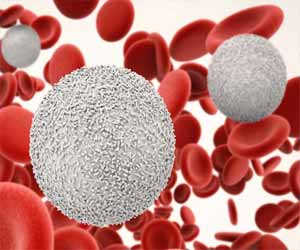- Home
- Editorial
- News
- Practice Guidelines
- Anesthesiology Guidelines
- Cancer Guidelines
- Cardiac Sciences Guidelines
- Critical Care Guidelines
- Dentistry Guidelines
- Dermatology Guidelines
- Diabetes and Endo Guidelines
- Diagnostics Guidelines
- ENT Guidelines
- Featured Practice Guidelines
- Gastroenterology Guidelines
- Geriatrics Guidelines
- Medicine Guidelines
- Nephrology Guidelines
- Neurosciences Guidelines
- Obs and Gynae Guidelines
- Ophthalmology Guidelines
- Orthopaedics Guidelines
- Paediatrics Guidelines
- Psychiatry Guidelines
- Pulmonology Guidelines
- Radiology Guidelines
- Surgery Guidelines
- Urology Guidelines
Lymphopenia linked to increased death risk from CVD, cancer: JAMA

Cleveland, Ohio: Patients with lymphopenia -- abnormal low levels of lymphocytes -- are at increased risk of death from cardiovascular disease, cancer, and respiratory infections, according to a recent study published in the JAMA Network Open.
Lymphocytes are a type of white blood cell that plays an important role in the immune system. They defend the body by attacking at the first sign of an invasion by harmful organisms. Lymphocytes also play a key role in triggering other immune actions and help in building the body’s immunity through past infections and vaccinations. Its low levels in the blood, thus, is a common indicator of inflammation and weak immune system.
Dysregulation of immunologic function is associated with autoimmune disease, malignant neoplasms, infections, and cardiovascular disease. Inflammation promotes malignant disease and worsens cardiovascular disease outcomes. Immune exhaustion or failure may lead to sepsis, cancer, and infectious diseases. The extent to which lymphopenia is associated with survival in the general population and whether lymphopenia is associated with additive risk beyond established risk markers has not been previously studied.
David A. Zidar, University Hospitals Cleveland Medical Center, Cleveland, Ohio, and colleagues determined whether lymphopenia is associated with reduced survival in outpatients.
For the purpose, the researchers conducted a retrospective cohort study using data from the National Health and Nutrition Examination Survey (NHANES). They identified a cohort of 31,178 patients, of which the median age was 45 years, 51.6% were women, and the overall 12-year rate of survival was 82.8% using patients enrolled from 1999 through 2010. All patients in the study had completed blood tests and measurements including absolute lymphocyte counts (ALC), red blood cell distribution width (RDW), and C-reactive protein (CRP) level.
The primary outcome measure of the study was overall survival. Secondary outcome measures of the study were various cause-specific mortality outcomes, including cardiovascular disease, malignant neoplasms, infection, respiratory tract disease, and unintended injuries.
For the study analyses, relative lymphopenia and severe lymphopenia were defined as levels equal to or less than 1500/μL and equal or less than 1000/μL, respectively. Investigators noted comparative analyses performed int the study were adjusted for multiple variables included age at baseline, sex, race/ethnicity, total and high-density lipoprotein cholesterol levels, type 2 diabetes, blood pressure readings, and smoking history.
Key findings of the study include:
- Relative lymphopenia (≤1500/μL) and severe lymphopenia (≤1000/μL) were observed in 20.1% and 3.0%, respectively, of this general population and were associated with increased risk of mortality (age- and sex-adjusted hazard ratios [HRs], 1.3 and 1.8 respectively) due to cardiovascular and noncardiovascular causes.
- Lymphopenia was also associated with worse survival in multivariable models, including traditional clinical risk factors, and this risk intensified when accompanied by bone marrow dysregulation (elevated RDW) and/or inflammation (elevated CRP level).
- Ten-year mortality ranged from 3.8% to 62.1% based on lymphopenia status, tertile of CRP level, and tertile of RDW. A high-risk IH profile was nearly twice as common as type 2 diabetes (19.3% and 10.0% of participants, respectively) and associated with a 3-fold risk of mortality.
- Individuals aged 70 to 79 years with low IH risk had a better 10-year survival (74.1%) than those who were a decade younger with a high-risk IH profile (68.9%).
"These findings suggest that lymphopenia, especially when accompanied by altered erythropoiesis and/or heightened inflammation, is associated with reduced survival independently of and additive to traditional risk factors," concluded the authors.
This study, titled “Association of Lymphopenia With Risk of Mortality Among Adults in the US General Population,” was published online in JAMA Network Open.

Disclaimer: This site is primarily intended for healthcare professionals. Any content/information on this website does not replace the advice of medical and/or health professionals and should not be construed as medical/diagnostic advice/endorsement or prescription. Use of this site is subject to our terms of use, privacy policy, advertisement policy. © 2020 Minerva Medical Treatment Pvt Ltd